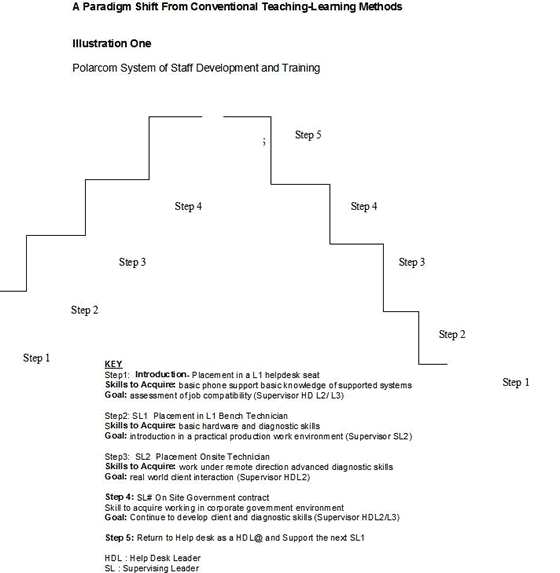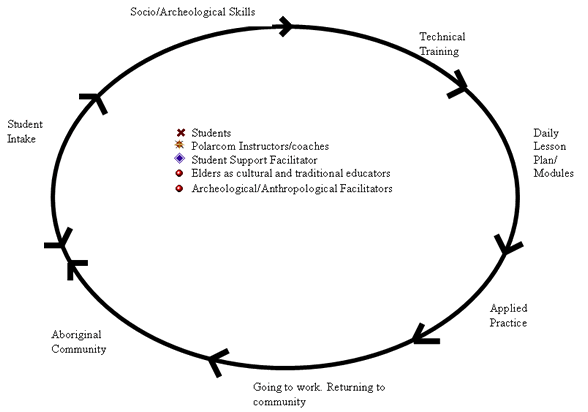|
Have we found any other way to test the true education acquisition skills of our students besides written examinations? - Exploration of a new paradigm Dudley Morgan Abstract Introduction “I chose to study the role of education in the development of scientific understanding, as it is experienced by Yupiaq people in the Kuskokwin region. How do Yupiaq students learn about science in the school, and what implications do that have for the integration of Yupiaq and Western scientific traditions? (Kwagley, 1995, pp 87). Similarly Gerry Angel, Managing Director of Polar Institute of Technology has been searching and discussing with the co-author `new systems of teaching and learning for Yukon First Nation students (Aboriginal students). Gerry has been trying new systems of modular teaching with applied practice skills and is now ready to embark on a new pilot project, akin to `re-discovery of the self, while re-discovering or discovering an acceptable learning environment. The reasons for a series of hypothesis tested and tried by the Polar Institute of Technology (PIT) was based on the premise that: “students come first in the teaching-learning environment, and that the best testimony to the institute was successful students who could demonstrate successful IT skills. To this end the institute continues to work, but along the way a series of discoveries have been made:
In the areas of items `a' and `b' the facilitators/coaches (faculty) of the institute quickly realized that the profile of some of the successful students was based on drive/motivation; self determination to succeed regardless of the odds and there were situations where some of the successful students would `self destruct' (for lack of a better word), due to social issues. This relates to item `c', but occurs after successful training and a successful period of working Brief Background to the Need for Exploring New Systems of Teaching-Learning The managing director of Polar Institute of Technology teaches and lives by multi-skilled performance. He is the manager of operations of Polargroup ICT Inc and operates the largest IT business in the Yukon. He has been involved in other successful business interest and at one time pursued a successful career in the field of Human Services. Coming from this background of experience, he was always exploring the limits of `minting' (creating challenges for learners and employees to solve in the IT industry, and choosing the best, to be a part of his business) IT professionals, where they could be the best in the business. In this light, he worked from a paradox - counter paradox scheme to allow entry-level professionals who earned industry certification or academic certification; or who may have an interest but no academic or practical training in the field to start on a working-learning process. This same principle and process has been adapted to general IT classes for learners. A measure of success was gained through this phase of staff development and training, and was then used as a system of modular instructional techniques with students. The co-authors had the opportunity to work on at least three instructional projects over a period of five years, using Polar Institute of Technology as a mobile laboratory. Some successes have been observed in training over a period of five years some of which include a series of information exchanges about what makes a student successful in the learning environment. Through these information exchanges a series of interviews have been carried out with the managing director of Polar Institute of Technology, which will become the foundation of this case study. What is Polar Institute of Technology (PIT) Doing That Makes a Difference? (a) The institute has developed and adapted a five step modular teaching/staff development and training approach, by taking staff from the lease denomination of technical work to the most complex, and returning to the lease denomination. The acquisition of the competencies and skills in those six steps, are not just for the purposes of applied skills, but the successful person, now enters into a teaching role. (See illustration One) (b) Utilizing Successful Past Students to Teach IT Skills at Polar Institute of Technology A Systems Approach to coaching and instructing for students has been used to try to increase successful learning outcomes. This is the system of utilizing one successful past student as a teacher/facilitator. Staff members working in the Polargroup ICT Inc industrial environment that have pursued the five-step staff development and training approach successfully are also used as coaches/facilitators. (c ) The managing director of PIT assumed the temporary role of Student Support Facilitator, by taking on the position to act as social facilitator, mediator and mentor for the students, for the purpose of getting them out of the social ills situation that they found themselves in. Based on this, the managing director has a strategic goal and approach to obtain funding for a Student Support Facilitator, who could represent the students and act on their behalf. (d) Planning and development for instituting a module for Rediscovery of Self through the use of socio-archaeological practice and research. (e) Acquisition plan for funding from Human Resources and Skill Development Canada, to support learners participating in the Re Discovery of Self Modules. The Leading Discussion to Pilot Project: A New Approach for a New Intake of Students. The context for consideration comes out of several observational opportunities:
Solutions That Could Make A Difference
Integrating the Re-Discovery of Self Series as a Part of the IT Training for One Intake of Students (Evaluation to be done at the end of training program) There are several studies about learning styles, and these are important. For instance Phillips (1983), Tharp (1989) and Shade (1982,1989) reported that American Indians and African Americans are frequently found to be more holistic-visual in their pattern of organizing learning on thought, while European Americans are frequently found to be more verbal-analytic. Polar Institute of Technology through observational practices and historical findings is quite aware that Yukon First Nations are `grounded' in their cultural and traditional philosophies (Morgan and Chataway 2005) and that this is linked to their general learning styles. To create a more effective learning environment PIT is prepared to make the following system changes with the new intake group of First Nation students. The system changes are:
Inferences Based on what we have discovered in observational needs assessment regarding social distress experienced by the students attending classes in the city, there is a feeling that the re-discovery of self through archaeological, social and historical discussions would bring about a sense of self in studying, as the self identity is important in learning (Goodkind 2006). Insert Diagrams One and Two Here REFRENCES Agar, K, Coalici, C and Morgan, D. Transforming Education for Development: The Yukon Experience in Overcoming Barriers to Education and Economic Development. Durban, South Africa: Pan- Commonwealth Forum on Open Learning. July 29 - August 2, 2002 Ayers, W. To Teach: The Journey of a Teacher. New York: Teacher's College Press, Columbia University. 1993 Banathy, B.H.A. Systems View of Education. Englewood Cliffs, New Jersey: Educational Technology Publications. 1992 Brauer, A. Masters Degree Portfolio. Seattle, Washington: University of Washington. 1994 Bubolz, M.M. and Sontag, M.S. Human Ecology Theory: Sourcebook of Family Theories and Methods A Contextual Approach. New York: Plenum Press. 1993 ] Fullan, M. Change Forces: Probing the Depths of Education Reform. New York: Falmer Press. 1993 Garcia, E. Understanding and Meeting the Challenge of Student Cultural Diversity. Boston: Houghton Mifflin. 1994 Goodkind, J.R. “Promoting Hmong Refugees' Well-Being Through Mutual Learning: Valuing Knowledge, Culture and Experience”. American Journal of Community Psychology, March 2006 -37(1/2)1-156, 7-92 Jonassen, D.H. Objectivism Versus Constructivism: Do We Need a Philosophical Paradigm? Educational Training Development, 1992, 39 (3), 5-14 Kwagley A.O. A Yupiaq Worldview a Pathway to Ecology and Spirit: Waveland Press, Inc. Illinois, USA, 1995 Ladson - Billings, G. The Dream keepers: Successful Teachers of African-American Children. San Francisco: Jossey-Bass. 1994 (a) Morey A.I, Kitano M.K. Multicultural Course Transformation ion Higher Education: Allyn and Bacon, Needham Heights, Massachusetts USA, 1997 Palazzoli MS, et.al. Paradox and Counter Paradox, Feltinelli Editore, Milan, Italy, 10975 (third printing March 1980) Phillips, S.U. The Invisible Culture: Communication in classroom and community on the Warm Spring Indian Reservation, White Plains, New York: Longman, 1983 Ravensdale D.A. Creation's Manifesto - the Greater Purpose - Spiritual Intelligence, Sunrise Printing Ltd, Edmonton, Alberta, Canada. 2000 Shade, B.J.R. “Afro-American Cognitive Style: available in School Success?”. Review of Educational Research, 1982, 52 (2), 219-24 Shade, B.J.R. (ed) Culture, Style and the Educative Process. Springfield, Illinois: Thomas 1986 Stacey, R. Managing the Unknowable. San Francisco: Jossey-Bass. 1992 Stoney, R. Comprehensive Community - Building Strategies: Issues and Opportunities for Learning. Chicago: Chapin Hill Center for Children. 1994 Tharp, R.G. “Pschocultural Variables and Constants: Effects on teaching and Learning in Schools”, American Psychologist, 1989, 4 (20, 349-359 Wlodkowski, R.L. and Ginsberg, M.B. Diversity and Motivation - Culturally Responsive Teaching. San Francisco: Jossey-Bass. 1995 Figures |

